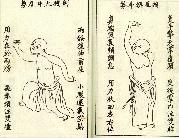CONDUCTING RESEARCH IN QIGONG

An old qigong text showing two exercises from Eighteen Lohan Hands
QUESTION
I am finishing my last doctorate courses in Clinical Psychology this year, and I am interested in conducting research in qigong as part of my dissertation. In your opinion, what does the qigong field need in terms of research? Or, what would be worth studying?
John, USA
ANSWER
Congratulations for your doctorate courses. You will find research into chi kung rewarding for yourself as well as other people, for there are many wonderful things chi kung can offer the modern world.
But I would like to modify your first question to “What do modern societies need in terms of research with special reference to qigong?” This is probably what you mean.
The rephrasing of the questions will set the perspective right. I am sure the significance of this new perspective does not apply to you because you already know and value the contribution of qigong (chi kung), but it is important for those who think that when they do any research into qigong, they are doing qigong and qigong masters a great favour, when in reality it is the other way round.
Qigong and qigong masters do not need any research to confirm the effectiveness of qigong. The real masters as well as those who have benefited from qigong know its effectiveness from their direct, personal experience. It is crucial for researchers to appreciate this point. It will enable them to understand not only why many masters are not keen on research, but more importantly why those who jump on the chance of doing research with them may not be genuine masters, and consequently their research findings will not be valid. Bogus masters who teach gymnastics or dance will grab the research opportunity to enhance their reputation.
The following true story may illustrate the attitude and perspective of many researchers. One of my qigong students, who is a world renowned surgeon, knowing my successful work with many cancer patients, suggested to his colleague who heads the cancer department in their hospital to conduct some research with me into cancer cure.
The cancer expert — interestingly, she is publicly acknowledged to be a cancer expert although neither she knows about cancer (which is not a slight on her, as nobody knows what cancer is) nor is the recovery rate of her cancer patients high — suggested that I should submit a proposal and that I should pay for my expenses in the research.
My student asked why I should pay when actually I was helping her. Her reply, which I believe would be legitimate from her perspective, was that the research would make me famous and I would subsequently earn a lot of money from the reputation I might gain from the research.
My student told her that I was already sufficiently known, that I already have a lot of students, and that I had no need for further publicity. My stand was that if she was interested to research into my success with cancer patients, she should submit a proposal to me, instead of the other way round. After all I would be sharing with her secrets which masters in the past might not even tell their daughters.
After rephrasing the question, let us now examine the answer. Modern, especially western, societies face two urgent problems, namely degenerative diseases and spiritual loneliness. Chi kung happens to be excellent in overcoming these two problems. Chi kung has both sound theoretical explanation as well as adequate practical cases to substantiate this claim.
While overcoming degenerative diseases and overcoming spiritual loneliness through chi kung are both worth studying and researching into, I believe the first topic will be more appropriate at present. You can take degenerative diseases collectively or take one degenerative disease individually at a time, such as cancer, cardiovascular disorder, diabetes and asthma.
The above is taken from Question 15 of December 1998 Part 1 of the Selection of Questions and Answers.
LINKS
Courses and Classes
